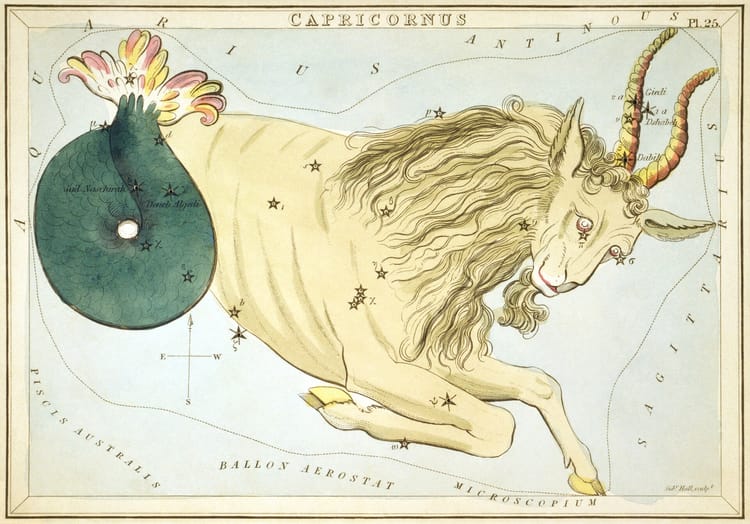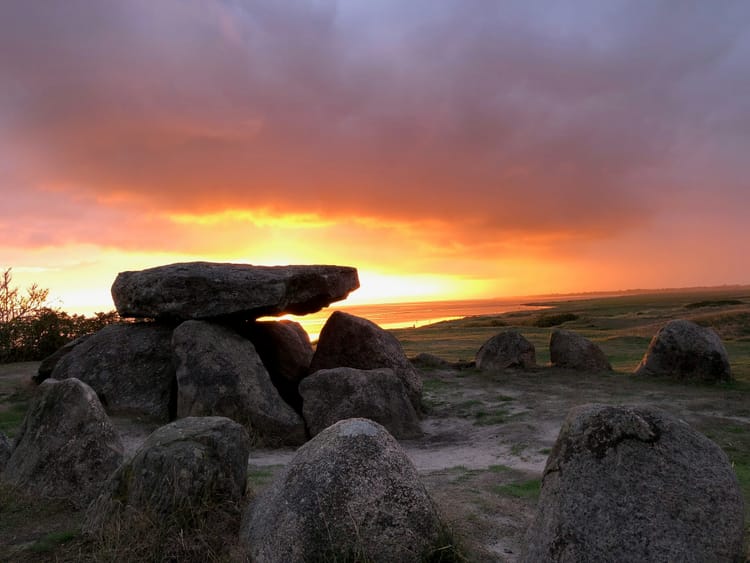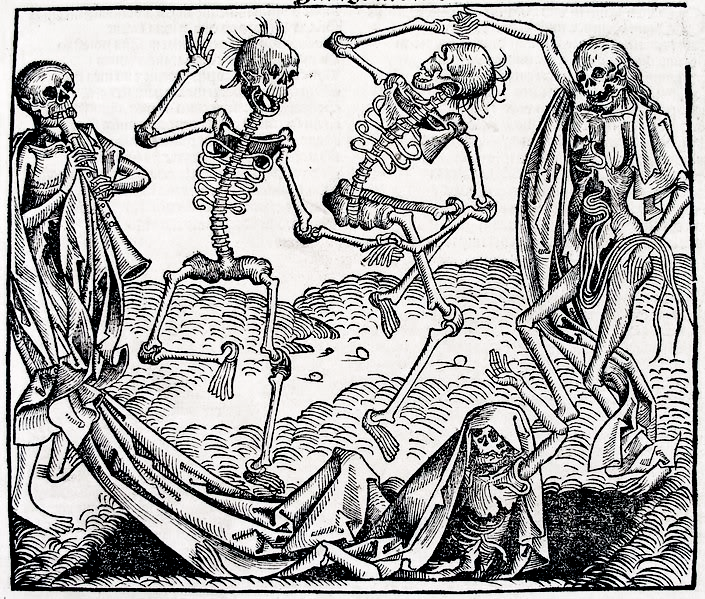Last Quarter: Margaret Killjoy on confronting apocalypse

Hello. It's Friday, and I'm premiering a new post format: the interview. The themes discussed still very much align with what I would normally publish for a Last Quarter week, but this time you can encounter a more conversational tone on my part, and more importantly you can encounter someone else's altogether different voice. Although Salt for the Eclipse is centered around a sum total of ideas that I have yet to encounter anyone else writing about under a unified heading — making this newsletter "uniquely me," as it were — for a long while I've also strongly believed in not just pontificating into the wind. Hence why I repeatedly request commentary or keep trying to build momentum for seasonal reader Q&A posts. And I've also started to envision periodically offering dialogue instead of monologue, enriching posts with others' perspectives in a more thorough way than a simple citation here or a blithe allusion there.
My hope to do this was undercut by doubt for a while. I have a loyal but very, very small readership; in terms of interviewing anyone who's already accustomed to interview requests, e.g. even mildly significant people in a given subculture, I can only add so much to their own publicity. And since I'm quite a fringe writer even under my legal identity, I likewise would expect plenty of my semi-famous living inspirations to prioritize speaking with known quantities; that's basic arithmetic for someone's free time. I love to imagine that in keeping with my anarchist values I would never consider myself too important to talk to random people, but this has to be weighed against everyone's right to privacy or boundaries. For the moment, I suspect the way around these problems could be to publish interviews with people I already know, if they would be interested — and after all, why not? Neither of us need to have a large audience in order to have a valuable conversation to share. So if we're friends or (genuinely close) social media follows and we have shared interests around topics that belong in Salt for Eclipse, perhaps you should be ready for me to approach you with an interview request of sorts.
But in the meantime, earlier this year I reached out on a whim to Margaret Killjoy. To use her own personal summary: Margaret Killjoy (she/they) is a transfeminine author, podcaster, and musician based in the mountains of Appalachia. She is the host of the radical history podcast Cool People Who Did Cool Stuff and co-host of the preparedness podcast Live Like the World is Dying. She is the author of The Sapling Cage, Escape From Incel Island, The Lamb Will Slaughter the Lion, and many other books. She is the principal songwriter for the feminist black metal band Feminazgûl. Her work commonly explores themes of anarchism, magic, hope, and death.
As I listen to Live Like the World Is Dying and have deeply resonated with past things she's written about apocalypse and preparedness, I thought that if there were one public figure I would love above all else to speak with about such matters for Salt for the Eclipse, it would have to be her. To my surprise and honor, Margaret responded and very generously agreed to dialogue back and forth for this purpose. After enjoying some back and forth e-mailing, I've edited my questions and her answers into what I hope is a freely flowing presentation. I am quite grateful for the time she invested in this, even as I also got the sense that like me, this fellow anarchist doesn't want to see her fame as a barrier against down to earth, human to human interaction. But now, in any case, to the interview itself.
Thank you so much for offering to bring your perspective to readers here, many of whom are presumably interested in topics that might be described as "apocalypse readiness." Could we start with some insight into how you became interested in preparing for the kinds of situations that are being created or exacerbated by the ecological crisis and breakdown of late stage capitalism?
Well, I spent the first ten or twelve years of my adult life as a wanderer, living out of backpacks or vans, and from there proceeded to spend about five years living more properly off-grid in a fixed location. So preparedness was just kind of part of life, in that context. I didn't really have a way to use money to solve my problems, because I didn't have any money, so I was used to repairing my clothes or scavenging for food or whatnot.
I started "prepping" more consciously once I stopped wandering and started living off-grid. I have a dear friend who works as a researcher in food and climate, and she called me one year, probably 2016 or so, and warned me basically, "Look, the food system probably won't collapse next year, but it's more likely to collapse next year than at any point in the past several decades," because of the impacts of climate change on soil and food systems. So I started spending more of my scarce disposable income on things like buckets of food and rice. After that, I built a little 12 x 12 A-frame cabin and lived in it, and then the pandemic hit, and I suddenly found myself relying on my scant preparedness stores for most of my food. I learned a lot about what did and did not work.
Now I have slightly more resources, so I am more prepared than I was before, but of course there's no limit to "how prepared" someone can be.
How would you say your mindset about preparedness differs from the reactionary bunker mentalities that tend to represent "prepper" culture?
So I'm happy to say this is starting to change, but yeah, there's a problem where the most visible "preppers" we see are far-right folks who just want to dig a bunker into a hill and live there with their beans and rice and spam and bullets and shoot anyone who comes too close.
The thing that even centrist — and even center-right! — preppers are realizing is that we actually need one another. People are the most valuable resource in preparedness. Labor produces all wealth. The more people you have, the more food you can grow. The more diverse your community is, the more ways you have of looking at problems and the more solutions you can dream up. Humans did not evolve to live alone in the woods.
So at the end of the day, I am interested in the marriage of individual and community preparedness. I'm interested in how individual preparedness puts us in a better position to help our communities. And I've seen it, too, when I went down to donate a bunch of my preparedness supplies to my friends in the wake of hurricane Helene in western North Carolina. People who were more self-reliant immediately started using that self-reliance as a stable base from which to begin to help the communities around them. And vice-versa, too… existing social networks, activist groups, harm reduction groups, infoshops, churches, mutual aid organizations, etc. were able to use their strong community preparedness to then help individuals.
In my experience a lot of Preparedness 101 discussions come down to individuals and communities needing to do our own assessment of what our localized risks actually are and what we're realistically capable of learning, building, collecting, distributing, etc. But even though it's never a one size fits all affair, how would you summarize your own lifestyle within a preparedness context? When starting the process you've since been engaged in, what were some important steps you began with, and are there any steps you only realized were important after a while?
So... oddly, my own life personally is a bit of an outlier of what I would recommend to others. I live on a mountain in West Virginia on some acres in a rural town, and most of the time it's just me and my dog, and yeah, my basement full of beans and rice. That's not what I would recommend to most people. This wasn't really a preparedness decision for me, but instead a personal one — I enjoy rural life. I am a pretty serious introvert, and mostly I want to be left alone to write and read. From an actual preparedness point of view, I'd say that people living in non-major cities and large towns, with resilient communities and interlocking social circles, are in a much better position. For most crises, I would evacuate my hidey-hole and head down off the mountain to go help and be helped by others. Though I suppose for some different types of crises, I would just invite everyone up here. It all depends!
I started by collecting food and water and by talking to other people about preparedness, and I think that was a good first step. In terms of what I didn't realize was important until later, I'd say... hygiene. Access to ways to clean yourself and your space. When covid hit I lost access to the place I was using to shower, and it was quite a struggle for the first few months to wash my clothes and my body in winter. Once I finally set up an off-grid hot water setup, my life improved 500%.
In this newsletter I frequently write about how the state of the world today factors into trauma, anxiety, and similar mental health challenges, and vice versa. I've personally found a number of methods for taking care of my mind and heart, and for allowing my trauma to heal instead of letting it rule me. But it's not easy to do that and also prepare for very real instability, loss, and danger. As you've identified yourself on your podcast as someone who deals with chronic anxiety as well, is there any approach that's helped you become more prepared for off-grid living, local unrest, or similar — without becoming overwhelmed?
I actually find overall preparedness to be a very calming activity. Rather than freaking out about all of the things that could possibly go wrong, I pick a single thing and begin to prepare for it. Once that thing is crossed off the list, I can stop worrying about that thing. Take when I was living in that cabin. Forest fire was a major anxiety of mine — we weren't out west, but everywhere in the country is more fire prone than it was, and forest fire was a minimal but serious threat. So I figured out my plan: I had a go bag, my car was always at least half full of gas. I knew what I would grab and I knew the various routes out of the place that I was, and I knew which of my neighbors might need evacuation, and then... that was it. I hadn't "solved" forest fire but I knew what my plan was, so I stopped worrying about it.
So yeah, in order to not be overwhelmed, you pick something and you work on it. Push that rock up that hill. Sure, there's a different rock to push up the hill tomorrow, but that's tomorrow's problem — or, tomorrow's fun challenge.
I relate to this explanation a lot, since I likewise find that making plans and having or knowing useful things can help me feel as in control of a potential situation as I can ever be. I know that my trouble, though, often lies in thinking so many steps ahead that I don't truly let myself relax. Do you have any recommended approaches for staying in the moment — for being prepared, but not fixated?
Yeah, that's a real struggle. We have this desire to look at the entire problem all at once, and focus on the steps that are far in the future, and not do a good job of breaking it down into steps. One thing that's helped me is to actually just write the problem and solution down on paper... I think we all have adapted so much to digital technology that we struggle with attention. Obviously some people more than others, of course. And it helps me personally to write it down. When you know what steps you're going to take, you can take some of those steps, then cut off for the day, or week, or whatever, knowing you'll know how to come back to it so you can turn your brain off a little.
In terms of checking news to see what local or global events might directly impact you, how do you pace that with anxiety management?
Doomscrolling is probably bad for my mental health, but I dunno. I think feeling like I have the pulse on what's happening actually kind of helps for me. And then I text people I care about to be like, "Did you see that thing that happened?" and they're all freaked out by it, but I'm often not? I mean, sometimes I am. But I am preparing for various possibilities, so it's just a matter of seeing which possibilities are more... possible... and focusing on those.
I do find that despite my usual avoidance of news when it's more likely to just traumatize me rather than give me anything actionable to do, suddenly I have the doomscrolling itch again because I feel like there are now constant events on the federal government level where my loved ones and I may have to actively respond. It's analogous to how I avoid constant eco crisis news — I already have a good sense of what to generally be ready for — but I still tune in closely to local extreme weather reporting. But as I try to stay politically informed day-to-day again, the problem is that a lot of news sources don't let me filter what I see, social media is unreliable, and forums like Reddit have overwhelmingly alarmist comments everywhere. So... where do you get your news?
Phew, there's the million dollar question. Social media is an echo chamber cesspool, mainstream news is owned by oligarchs, though often run by actual journalists, to greater or lesser degrees. I kind of try to look across a lot of different sources. Reddit gets speculative, but you can kinda follow up on those specific things that stand out to you. I also have some people in my life who somehow seem to know what's going on better than me, and so I talk to them about it too.
Some podcasts do a good job... my friends on It Could Happen Here don't cover everything, but what they do cover I think they tend to cover well.
A tough dichotomy that can come up for me and maybe others in preparedness work is the anxiety attached to specializing in particular skills or gear-gathering, versus the anxiety attached to generalizing. On the one hand, specialization seems wise if you have community around you who can take care of the things you don't have time or ability for, but there can still be the fear that you really should know xyz other thing and you're helpless without it. On the other hand, generalization can address that fear and create a sense of self-sufficiency, but then there can be the fear that the self-sufficiency is an illusion because you only know enough about everything to do it badly. Is this a familiar dilemma for you, and what do you recommend?
Oh, this is one of my favorite false dichotomies that we find ourselves accidentally falling back on! Generalization versus specialization. My answer to that question is, "Yes, both." There's some stuff that probably most people should develop a basic understanding of. For me, the best example of something I will never specialize in is medicine, especially trauma care. I am incredibly squeamish. I hate blood draws. I can't watch gore or surgery. I get through my days imagining the inside of my body is just a big ball of pure white light. But I also go to trauma medicine classes, stop the bleed trainings, CPR, all of that. Why? Because everyone who can should. Because knowing how to apply a tourniquet and stop the bleeding so that I or someone else can later reach a higher level of care is, basically, the most important thing we can all do.
I have no intention of becoming the person who provides that higher level of care, though I suppose in certain emergencies I would study it if necessary. But that's unlikely.
I'm like this with cooking too. I can cook a couple impressive meals, and I think it behooves everyone who can to learn how to feed themselves and others, but I am very unlikely to ever specialize in becoming some impressive cook.
I deeply specializing in writing and history. I specialize a bit less in communication and media more broadly. But even though I'm never going to become a farmer, when it's time to bring the harvest in, in some anarcho-communist utopian community I might one day live on, I'll go help bring the harvest in, if I'm physically able.
For a lot of people our age or younger — and maybe older — it's increasingly hard to spend time online without brushing up against so-called doomer culture. How do you think we should effectively and soberly talk about a pending or even active apocalypse, without encouraging others around us to just "wait for the end"?
Oh, this is a tough one, and it's surprising to me how tough it is. I talk about preparedness at all and people accuse me of being a doomer. I talk about activism at all and people accuse me of spreading "hopium." People and their fucking dichotomies!
Solving problems involves looking at the problem soberly and then working on solutions to that problem. Isn't that what we all signed up for, as humans, by being alive? We try to identify and solve problems. I think the problem is that people think, "Unless I am certain to win, there is no point in fighting," and that is just nonsense.
Anyone who has ever played D&D or something should know better than this... you swing your sword, you might only have a 30% chance of hitting any given time, but you're still going to swing that sword if it's your most effective means of attack, and you do it until you win, you die, or you come up with a better plan. Like... are we going to "solve" climate change? No. It's not a solvable problem. Can we address it? Yes. Is addressing it at all way better than not addressing it at all? Yes.
As far as doomerism goes, I routinely encounter people who would describe themselves as being on the left or at least antifascist, but who express despair at humanity's capacity to come together in community. They're already waiting for the end. I often have the impression these are people who, like me, have experienced trauma around social rejection or neglect. Do you have any thoughts on how to encourage such people without resorting to toxic positivity?
People are cliquish and shitty. I live alone on a mountain for a reason. But honestly, when crisis hits, most people realize that all that shit doesn't matter and set aside petty differences and work together for common survival. It's why apocalyptic fiction is oddly utopian. We all know that the breaking down of social barriers is, on some level, desirable.
I couldn't agree more. And I think sometimes people on the left or in heavily marginalized populations tend to assume that besides the stereotypical infighting amongst ourselves, everyone who's not one of us is going to declare open season on us "when the shit hits the fan." But realistically, while there are enough open fascists and fascist sympathizers out there that we should be ready for the threats they pose, I feel like assuming the worst from everyone who's not exactly like us is just a mirror image of that same atomizing, isolating bunker mentality, isn't it?
Oh that's an interesting comparison, to a bunker mentality! I think that's... more true than not. For sure, it's worth being aware of how societies have turned en masse against marginalized groups. It's just... usually not? And the more we assume everyone is out to get us, the more we assume everyone is our enemies, the more we isolate ourselves, the more people are likely to be out to get us. It's like... my dog likes people who like him, and is wary of anyone who is wary of him. I think humans do that too, we just hide it all with language. Of course, not everyone is safe, and we've got to be a bit careful, but I find that when we challenge people to rise to the occasion, to be their best selves, they're more likely to be their best selves than if we assume they'll be shitty.
There are so many people being marginalized by this current fascist regime. Other fascists in history have been in substantially more homogenous populations. They absolutely need to divide us to conquer us, and our task is to prevent them from doing that. To actively build bridges with people who aren't quite like us, who don't use the same jargon as us.
Even though it's impossible to know what will really happen, what do you think are the more likely best case and worst case scenarios for the current political situation, on Turtle Island or globally, and incorporating the current risks to life on Earth or at least to our species?
Worst case scenario? We spend the next ten years or so in the equivalent of Nazi Germany, but possibly without an unlikely plucky alliance of empires — the UK, the USA, and the USSR were probably the three most evil empires in the world after Nazi Germany and the Japanese Empire in the 1930s — to strike the US down. Then internal contradictions caused by climate change cause the whole thing to fall apart, in ways that are both good and bad. Then climate change more or less destroys life on Earth, with people living underground in climate controlled areas and nature being knocked back to something that will take millions of years to re-evolve from. I guess I'd say that's the worst case scenario.
Best case scenario? The current dismantling of the US government spurs an antifascist movement that is pluralistic, but heavily influenced by decolonial and antiauthoritarian values. Trump overplays his hand and is forced out. Culture war shit is left aside and an actual working class movement begins to confront oligarchy. Increasingly powerful local movements inspired by indigenous practices, democratic confederalism, and/or anarchism start to network and build power. Rapid de-industrialization becomes a worldwide effort, and we stop putting so much carbon in the atmosphere. The world decentralizes dramatically but maintains a federated structure that allows us to share information and work together in solidarity. Nature takes a serious hit, people take a serious hit. People work hard to protect ecosystems and preserve biodiversity, while accepting that they will not fully succeed.
And in either version, you and I are going to die. And in either version, the Earth is going to get warmer. And on a long enough timeline, in either version, the Sun will expand and swallow the Earth and no one will remember that humanity existed unless they find radio waves or probes deep in the galaxy.
I used to find those last thoughts tremendously distressing when I was younger. Now I find them oddly comforting, but not because I think humans and the Earth deserve to be destroyed — more because I think that just like everyday mortality, the ephemeral nature of our planet makes it even more important that we make the most of it while we're all here together. So, ideally we do what's in your best case scenario, the way that things stand. In that vein... what do you think would constitute Trump overplaying his hand? And what do you think about the chance of something like a general strike in the US, which some people are planning, actually reaching beyond anarchist participants?
Well, about general strikes... I feel like everyone has the wrong idea about them. Some people are like, "Let's call a general strike!" and other people are like, "No, you have to plan them for years, they don't happen spontaneously!" and they're both wrong. Most general strikes in history have been spontaneous... but most of them have relied on robust, radical, and very often anarchist union movements. When most workers are organized, it's quite easy to have a spontaneous general strike. Well, easier. But some general strikes have been by marginalized groups, especially women, who historically weren't incorporated directly into the labor movement because they weren't historically in the workforce.
I think that insurrection and revolution — that is, spontaneous, informal revolt and coordinated, formal revolt — can and should work hand in hand. Calling for general strikes... look, if you just call for it on Bluesky, probably nothing will happen. Most sparks we cast don't catch tinder. But sometimes they do. Building tinder is slow and painstaking work, casting sparks is quick.
But also, well, the state is building up tinder for us right now too. Federal workers being cast out? The de-diversification of the military? Social services being cut? All those things are bad, to be clear. But they change the terrain on which we're fighting, and we have to look to see what advantages that offers us. We have to offer alternatives. As social services disappear, people will be looking to meet their needs through mutual aid, and we can look to network mutual aid groups between cultures and regions. As the Democratic Party continues to prove it is full of gutless bootlickers, we can show people ways of organizing outside the party form.
And then? Then I guess we'll see where it goes.
Thank you for reading — and remember, if I know you at all well, you too might receive an interview request sometime. Particularly if readers enjoyed this one.
Next week there will be a Calan Mai (Beltane) post for Occult tier subscribers only, but after this public posts will return with a Taurus-season meditation on how the best hand crafts wed the beautiful and the functional.





Member discussion